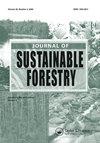木材燃料生产商对其在加纳活动的环境影响的见解
IF 1.8
4区 农林科学
Q3 FORESTRY
引用次数: 5
摘要
摘要:本文采用定性方法,考察了木材燃料生产商对其在金坦波北市森林地区活动的环境影响的见解。录音采访被抄录下来,并根据人工分析按主题进行分析。结果表明,由于绝对贫困、失业以及做饭和取暖所需的能源,木材燃料生产者别无选择,只能从事木炭生产和薪材收集活动。然而,木材燃料的生产者并不建立他们的种植园来提取木材燃料;而是依赖于天然森林来提取它们。这导致了包括毁林、森林退化和生物多样性丧失在内的环境影响。由于目前木材燃料的开采状况对森林资源造成了严重的环境后果,我们建议林业委员会和市议会开始植树活动,使木材燃料成为加纳的可持续能源。强烈建议开展减贫项目,如生计赋权脱贫项目(LEAP),旨在支持希望从事其他形式生计活动的居民,包括剪切黄油加工,以减轻他们的绝对贫困。这将有助于减少他们对森林资源的过度依赖。本文章由计算机程序翻译,如有差异,请以英文原文为准。
Wood Fuel Producers’ Insight on the Environmental Effects of Their Activities in Ghana
ABSTRACT Drawing on a qualitative approach, this paper examines wood fuel producers’ insight on the environmental effects of their activities in the forest area of the Kintampo North Municipality. Tape-recorded interviews were transcribed and analyzed thematically based on manual analysis. Results indicated that wood fuel producers have no option than to engage in the activities of charcoal production and fuelwood collection due to absolute poverty, unemployment, and the need for energy for cooking and heating. However, producers of wood fuel do not establish their plantations for wood fuel extraction; rather depend on the natural forest for their extraction. This resulted in environmental effects including deforestation, forest degradation, and loss of biodiversity. Since the current state of wood fuel extraction presents dire environmental consequences to the forest resources, we recommend Forestry Commission and the Municipal Assembly initiate tree planting exercises to make wood fuel a sustainable energy in Ghana. Poverty reduction programs such as Livelihood Empowerment against Poverty (LEAP) targeted at supporting inhabitants who want to engage in other forms of livelihood activities including shear butter processing to alleviate them from absolute poverty are strongly recommended. This will help reduce their over-dependence on the forest resources for survival.
求助全文
通过发布文献求助,成功后即可免费获取论文全文。
去求助
来源期刊

Journal of Sustainable Forestry
Social Sciences-Geography, Planning and Development
CiteScore
3.90
自引率
12.50%
发文量
42
期刊介绍:
Journal of Sustainable Forestry publishes peer-reviewed, original research on forest science. While the emphasis is on sustainable use of forest products and services, the journal covers a wide range of topics from the underlying biology and ecology of forests to the social, economic and policy aspects of forestry. Short communications and review papers that provide a clear theoretical, conceptual or methodological contribution to the existing literature are also included in the journal.
Common topics covered in the Journal of Sustainable Forestry include:
• Ecology, management, recreation, restoration and silvicultural systems of all forest types, including urban forests
• All aspects of forest biology, including ecophysiology, entomology, pathology, genetics, tree breeding, and biotechnology
• Wood properties, forest biomass, bioenergy, and carbon sequestration
• Simulation modeling, inventory, quantitative methods, and remote sensing
• Environmental pollution, fire and climate change impacts, and adaptation and mitigation in forests
• Forest engineering, economics, human dimensions, natural resource policy, and planning
Journal of Sustainable Forestry provides an international forum for dialogue between research scientists, forest managers, economists and policy and decision makers who share the common vision of the sustainable use of natural resources.
 求助内容:
求助内容: 应助结果提醒方式:
应助结果提醒方式:


